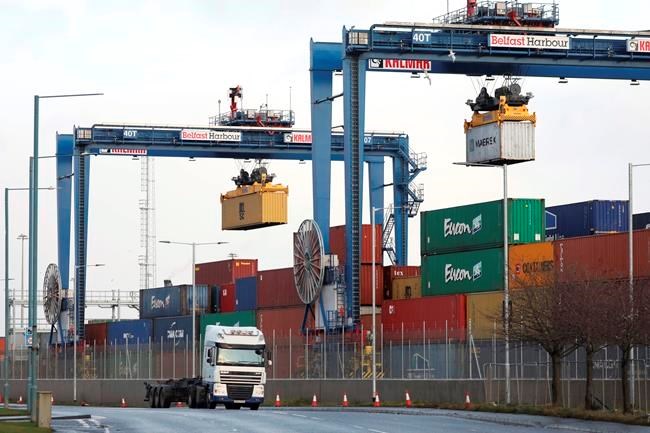LONDON — The leaders of Britain and the European Commission will make a last-minute push for a post-Brexit U.K.-EU trade deal over dinner on Wednesday, with both sides warning that the chance of reaching agreement by a year-end deadline is slipping away.
With just over three weeks until an economic rupture that threatens upheaval for businesses on both sides of the English Channel, European Commission President Ursula von der Leyen tweeted that she looked forward to welcoming U.K. Prime Minister Boris Johnson to Brussels on Wednesday evening.
Johnson’s office confirmed the two leaders would hold a dinner meeting ”to continue discussions on the future relationship between the U.K. and the EU."
The warm words masked a deep political divide between Britain and the EU over what their relationship will look like once a post-Brexit transition period ends on Dec. 31.
Johnson and von der Leyen, head of the EU’s executive arm, spoke by phone Monday to take stock of trade talks that have ground to a halt after months of tense negotiations. The two leaders said afterwards that “significant differences” remained on three key issues — fishing rights, fair-competition rules and the governance of future disputes.
Johnson said Tuesday that “the situation at the moment is very tricky," though he added that “hope springs eternal.”
German European Affairs Minister Michael Roth, whose country currently holds the U.K.'s rotating presidency, said “we are really in a very difficult situation."
The U.K. left the EU on Jan. 31 after 47 years of membership, but remains within the bloc’s tariff-free single market and customs union until the end of the year. Reaching a trade deal by then would ensure there are no tariffs and quotas on trade in goods on Jan. 1, although there would still be new costs and red tape for businesses.
Failure to secure a trade deal would mean tariffs and other barriers that would hurt both sides, although most economists think the British economy would take a greater hit because the U.K. does almost half of its trade with the bloc.
There was a breakthrough in one area, as the two sides announced they had reached agreement on how trade will work with Northern Ireland, the only part of the U.K. that shares a land border with the EU.
The Brexit divorce agreement struck by the two sides last year contains specific provisions for Northern Ireland to ensure there are no customs checks or other trade barriers along the border with EU member state Ireland.
Not all the details were hammered out before the U.K. left the bloc in January, and as trade talks foundered the British government introduced legislation in September giving itself powers to breach the legally binding withdrawal agreement.
Britain claimed its Internal Market Bill was needed as an “insurance policy” to protect the flow of goods within the U.K. in the event of a no-deal Brexit. But the move infuriated the EU, which saw it as an act of bad faith that could imperil Northern Ireland’s peace settlement.
On Tuesday, British Cabinet Minister Michael Gove and European Commission
Britain said as a result it would scrap its law-breaking measures, and Sefcovic said he hoped the accord would “create a positive momentum for the free trade agreement.”
The meeting between Johnson and von der Leyen comes on the eve of a two-day summit in Brussels starting Thursday — one the EU hopes will not be overshadowed by Brexit.
EU officials suggested negotiations could continue past Jan. 1, even as the two sides tumbled into a no-deal trading relationship. But the U.K. insists the talks must finish this year.
While both sides want a deal, they have fundamentally different views of what it entails. The EU fears Britain will slash social and environmental standards and pump state money into U.K. industries, becoming a low-regulation economic rival on the bloc’s doorstep — hence the demand for strict “level playing field” guarantees in exchange for access to its markets.
The U.K. government sees Brexit as about sovereignty and “taking back control” of the country’s laws, borders and waters. It claims the EU is making demands it has not placed on other countries and is trying to bind Britain to the bloc’s rules indefinitely.
With both sides seemingly entrenched in their positions, it was unclear what Johnson’s trip to Brussels could achieve.
Fabian Zuleeg, chief executive of the European Policy Centre, said it was a piece of political
“But what we don’t know is whether it is positive
“At this moment, we simply don’t know which
___
Lorne Cook reported from Brussels. Sylvain Plazy and Samuel Petrequin in Brussels contributed to this story.
___
Follow all AP stories about Brexit and British politics at https://apnews.com/Brexit
Jill Lawless And Lorne Cook, The Associated Press

